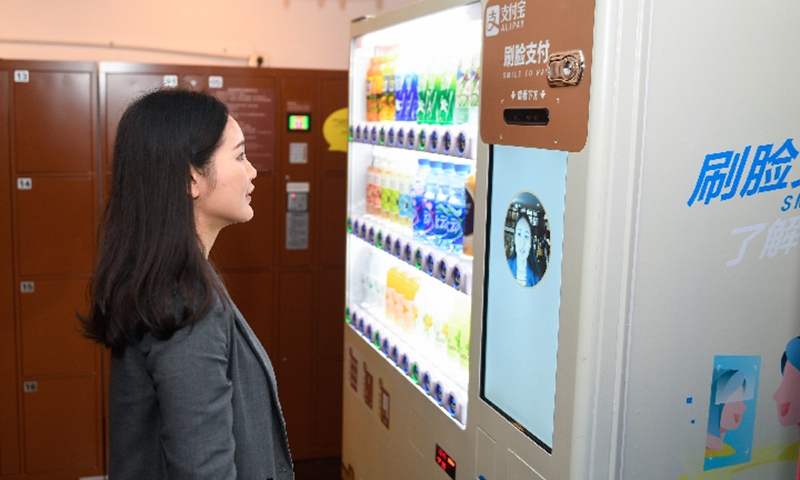Park in Hangzhou found guilty of breach of contract for using visitor’s facial recognition information
Park in Hangzhou found guilty of breach of contract for collecting visitor’s facial recognition info

A visitor tries facial recognition payment in a smart store in Wuzhen Town of Tongxiang, east China's Zhejiang Province, Nov. 6, 2018. (Xinhua/Huang Zongzhi)
Both plaintiff and defendant have decided to appeal after an East China court issued a ruling on China's first facial recognition-related litigation, determining that a local safari animal park's use of facial recognition information of park visitors collected by its upgraded admission system was a breach of contract.
The Hangzhou Safari Park was ordered by the Hangzhou Fuyang People's Court to compensate the plaintiff named Guo Bing, an associate professor of law at Zhejiang Sci-Tech University, 1,038 yuan ($158) in economic losses and delete his facial information that was collected when he applied for the annual admission card of the park in April 2019.
Guo had his fingerprints and photo taken by the park for the previous fingerprint admission system. However, the park notified Guo twice last July and October about an upgrade of its admission system and required his facial recognition information for activation of the admission card.
Regarding facial recognition information as highly sensitive private information, Guo disagreed.
When Guo's request to cancel the annual admission card and refund the admission fee was rejected by the park, he filed a lawsuit against the park in October 2019 for infringement of his privacy and breach of service contract.
The court ruled that the safari park's change in admission policies from fingerprint to face recognition during the period of the contract is a breach of contract.
The text messages sent by the park to Guo could not be regarded as contract content agreed by both parties and had no legal effect on Guo who has the right to require the park to shoulder related legal responsibilities.
The attorney for the defendant told the media that the park is not satisfied with the court's verdict, and it will appeal to the Hangzhou Intermediate People's Court, CCTV reported on Sunday.
However, Guo was not fully satisfied with the court's ruling, which did not support his most important claim.
"The most meaningful claim in my litigation was to confirm the invalidation of the park's notice to visitors about collecting their facial recognition information due to the new admissions system, which was overruled by the court," Guo told the Global Times on Saturday, noting that he would file an appeal to the Hangzhou Intermediate People's Court.
The most important claim of interest to Guo was to delete the facial recognition information, although his litigation also included requests to delete other biometric data such as fingerprints.
Guo suggests other people who have the same experience to negotiate with the park and to have their biometric data deleted, although the negotiation will be difficult.
"It is a common phenomenon that the public have no incentive to defend their rights although the infringement of privacy is an illegal behavior," said Guo, who noted that the court simply ruling the park's behavior as a contract breach has almost no deterrence value for its illegal behavior.
As a legal expert, Guo has previously noticed that while facial recognition technology does bring lots of convenience to life, it jeopardizes personal privacy and security, especially the information collected by residential compounds of many cities in recent years.
According to media reports, many cities including Beijing, Shanghai and Hangzhou, have applied facial recognition systems to the entrances to the residential compounds.
In view of the risk of biometric data being abused by property management departments, Guo submitted a proposal to the Hangzhou legislative body last month to ban the companies from collecting residents' biometric data.
If the proposal is adopted, Guo thinks it can serve as an example for other parts of the country in dealing with the controversial issue of facial recognition in biometric data application.


